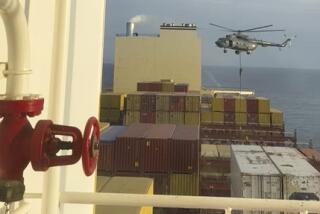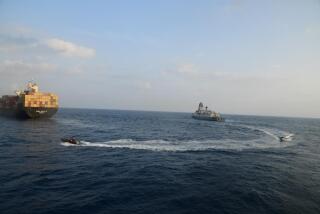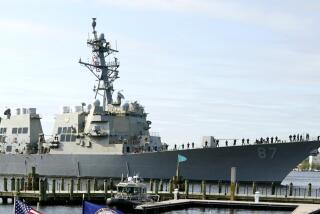Indians arrest 35 aboard U.S.-owned vessel reportedly carrying weapons
- Share via
NEW DELHI -- Indian police say they arrested 35 people aboard a U.S.-owned ship Friday and charged them with entering India’s waters with a large cache of weapons, in a case that spotlights largely unregulated security contractors operating on the high seas.
Indian officials say the MV Seaman Guard Ohio, reportedly flying the Sierra Leone flag, was detained a week ago and was anchored Friday in the port of Tuticorin in southern Tamil Nadu state. Police said 33 of the 35 people on board -- made up of 10 crew members and 25 armed security guards, including Indians, Ukrainians, Britons and Estonians -- were detained at Muthayapuram police station for questioning, with two left to watch the vessel.
The ship was found carrying some 30 assault rifles and around 4,000 rounds of ammunition that it did not declare or account for in its log, local media reported, citing security sources. The ship reportedly entered the Indian port of Kochi about 45 days ago without the weapons being declared or found before appearing in Indian waters again heavily armed.
“My suspicion is that the boat is a floating armory for private security agencies protecting against pirates,” Deputy National Security Advisor Nehchal Sandhu said this week.
The ship’s owner, Washington-based security company AdvanFort, downplayed the incident in a short press statement amid questions of why it reportedly failed to declare the weapons in Indian waters, as required, where it was going and what it was doing.
In a news release Monday, it said the ship was involved in anti-piracy operations in the Indian Ocean and was granted permission to enter the port “both to take on fuel and to escape the effects of Cyclone Phailin.”
But the Indian government, which reportedly booked the crew Friday for illegal weapons possession and for refueling 400 gallons of diesel fuel illegally purchased from a local fishing boat, apparently has a different view. Local media also reported that the ship was far from waters affected by last week’s cyclone.
An official at Tuticorin port, who asked not to be identified because he wasn’t authorized to speak publicly, said the security vessel was about 120 feet long and weighed 500 gross registered tons. The port has been told not to allow it to leave, he added. The official said he boarded the ship once and saw several bags but wasn’t able to discern their contents.
Peter Vrooman, a spokesman for the U.S. Embassy, declined to comment. British Embassy spokesman Marcus Winsley said his government was in email contact with the six Britons from the ship who had been detained. They have not yet been granted consular contact by the Indian government, Winsley said, adding that his office was in touch with Indian police in an effort to determine the charges.
AdvanFort said in its statement that the men provide counter-piracy protection and were in possession of protective equipment, uniforms, medical kits, rifles and ammunition, “all of which is properly registered and licensed to AdvanFort.”
The statement quoted company President William Watson as thanking the Indian coast guard and police for allowing the ship to refuel. “We look forward to returning this vessel to its duties as quickly as formalities and resupply operations are concluded,” he added.
India abuts the Arabian Sea, which has seen a large number of attacks by Somali pirates in recent years. Since a November 2008 terror attack on the Indian city of Mumbai, in which 10 militants arrived undetected by sea, and a February 2012 incident in which Italian marines guarding an oil tanker shot and killed two Indian fishermen, this nation has been increasingly sensitive to violations of its territorial waters.
Analysts said the latest incident highlights the weak oversight surrounding the use of private and military armed guards to protect vessels against pirate attacks. “This sort of thing is uncharted waters in terms of regulation,” said Saurabh Joshi, head of StratPost.com, a New Delhi-based defense information website. “And nations are usually very reluctant to allow relaxation of what they consider very strict laws against arms aboard ships.”
Given questions raised about the conduct of security contractors in Iraq and Afghanistan, it wouldn’t be a great stretch for national authorities to suspect them of arming insurgents within their borders, he added. “It seems like the Indian authorities deserve an explanation,” Joshi said. “It’s all rather strange.”
Michael Howlett, deputy director of the London-based International Maritime Bureau, said regulatory gray area or not, there’s little ambiguity about entering a port without declaring a weapons cache. “It’s a bit like a ship coming into the Port of Los Angeles with a load of arms on board,” he said. “It’s pretty clear.”
Analysts said these so-called floating armories have been around for a couple of years, helping along with stepped up naval patrols to deter Somali pirates while circumventing rules that prohibit cargo ships from themselves entering ports with weapons. Most remain in international waters, analysts said, so it’s not clear what this one was doing in India.
Driving the economics of these arsenal ships may be insurance discounts for owners of vessels targeted by pirates. An official with Lloyd’s of London, major underwriters for commercial shipping, said discounts vary depending on the vessel, voyage and who is doing the insuring. While armed guards lower the risk, “the savings on insurance are easily outweighed by the cost of the teams to the [ship’s] owner,” added Neil Roberts, a senior underwriting executive with Lloyd’s Market Assn.
ALSO:
Egyptians irked by official bid to curb protests
One of Syria’s top commanders killed during fighting
Legal experts teach Syrian rebels to prevent human rights abuses
Twitter: @markmagnier
Tanvi Sharma in The Times’ New Delhi bureau contributed to this report.
More to Read
Sign up for Essential California
The most important California stories and recommendations in your inbox every morning.
You may occasionally receive promotional content from the Los Angeles Times.










